The Journey presents that annual assemblage of scientifiction (stf or "steff") fans known as WorldCon!
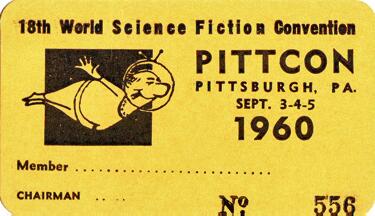
all pictures from fanac.org
Of course, I wasn't actually present at the con, it being held some 2500 miles away on the 17th floor of the Penn Sheraton in Pittsburgh. But I know people, and I have access to a million-dollar 'fax machine. Thus, even though the custodial staff is just barely finishing its sweeping up after some 300 attendees had a roaring great time, I am already able to bring you this report:
The primary purpose for a convention is to allow fellow fen (plural of fan) to mingle. Gordon Dickson likens it to a Gentleman's Club where adventurers can meet and compare notes before heading off back into the wild. Fred Pohl calls it a family gathering.
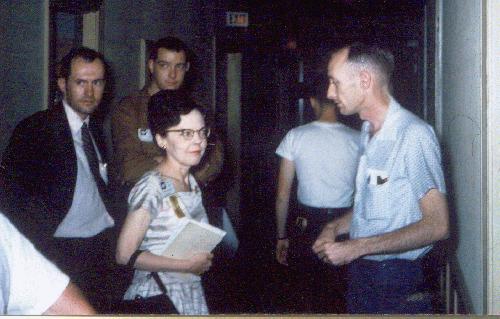

It looks like the demographics of fandom match that of publication: women are in the distinct minority, but they are present and often outsizedly significant.
Plenty of professionals attended, too.
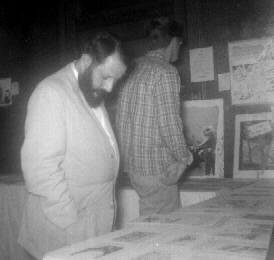
Avram Davidson
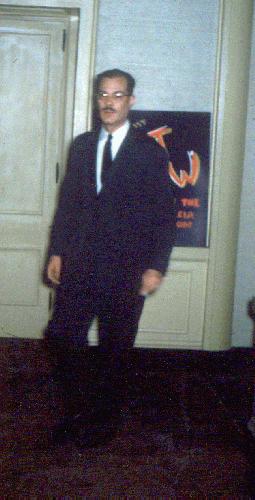
James Blish
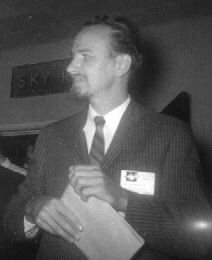
Ed Emshwiller

L. Sprague DeCamp
But it's not all about chatting up your friends. The convention offered all sorts of activities including panels, auctions (art, manuscripts, you name it), an art show, a dealers' hall, and a game room:

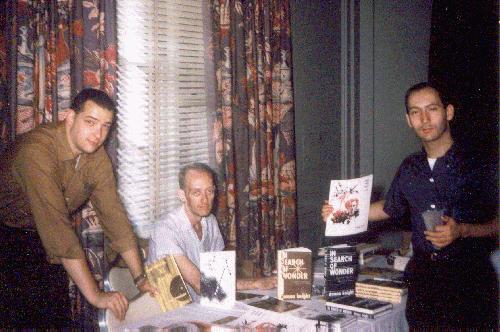

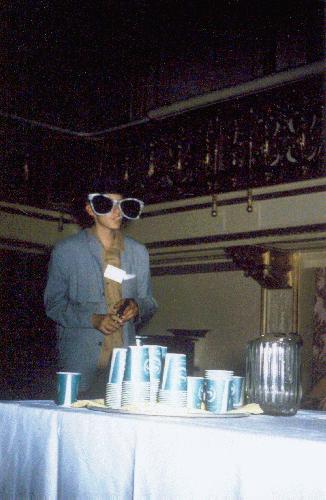
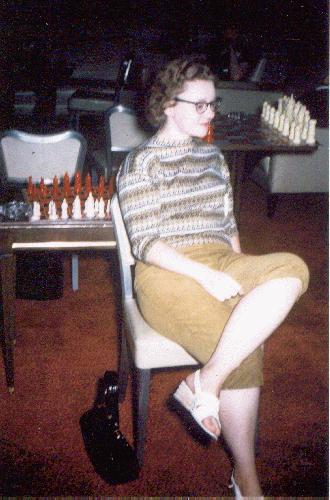
Saturday was dress-up day, with plays put on by club members and, of course, the night-time Costume Ball!




But what you've likely been waiting for with bated breath is the announcement of the Hugo winners. I, too, was keenly interested to see how the tastes of the Pittcon-going fans differed from my choices for 1959's best. As it turned out, we weren't too far off:
Best Novel
Starship Troopers by Robert A. Heinlein [F&SF Oct,Nov 1959; Putnam, 1959]
Nominees
Dorsai! by Gordon R. Dickson [Astounding May,Jun,Jul 1959]
The Pirates of Ersatz by Murray Leinster [Astounding Feb,Mar,Apr 1959]
That Sweet Little Old Lady by Mark Phillips (aka: Randall Garrett and Laurence M. Janifer) [Astounding Sep,Oct 1959]
The Sirens of Titan by Kurt Vonnegut, Jr. [Dell, 1959]
I didn't read a lot of novels in 1959, though I'd have thought Alas, Babylon would have beaten out the Astounding serials, which were 2 and 3 star stories. I'll let my readers tell me if the Vonnegut was any good. I can't argue with the winner, though. I liked it a lot. I understand Bob Heinlein was actually at Pittcon, which is unusual.
Short Fiction
Flowers for Algernon by Daniel Keyes [F&SF Apr 1959]
Nominees
The Alley Man by Philip José Farmer [F&SF Jun 1959]
The Pi Man by Alfred Bester [F&SF Oct 1959]
The Man Who Lost the Sea by Theodore Sturgeon [F&SF Oct 1959]
Cat and Mouse by Ralph Williams [Astounding Jun 1959]
Here, the fans and I are in virtually complete agreement. These are all 4 and 5 star stories, and the Keyes is not only among the best, but it is the longest (the Hugos combine all stories shorter than a novel into one category, whereas I divide them more finely). I might have excluded the Bester and the Farmer to include McIntosh and Simak, but that's a quibble.
Best Dramatic Presentation
The Twilight Zone (TV series) by Rod Serling [CBS]
Nominees
The World, the Flesh and the Devil (1959) [HarBel/MGM] Directed by Ranald MacDougall; Screenplay by Ranald MacDougall; Story by Ferdinand Reyher; based on the novel The Purple Cloud by M. P. Shiel
Murder and the Android (Sunday Showcase episode #1.5)
The Turn of the Screw (1959) [NBC] Directed by John Frankenheimer; Teleplay by James Costigan; based on the novel by Henry James
Men into Space (TV series) [CBS, 1959]
This one is interesting. I think mixing TV and movies creates too broad a category, and the result is MacDougall's fantastic and progressive The World, the Flesh and the Devil ending up as an also-ran. Moreover, The Twilight Zone was not even halfway through its first season by close of 1959–not that much to go on.
Still, it is a good (nay, groundbreaking) show, so I'm not complaining too much.
I haven't seen Murder or Turn. Men into Space, while laudable for its attempts to portray realistic space travel, has always been dull as dirt when I've tuned in.
Best Professional Magazine
The Magazine of Fantasy & Science Fiction ed. by Robert P. Mills
Nominees
Astounding Science Fiction ed. by John W. Campbell, Jr.
Galaxy ed. by H. L. Gold
Amazing Science Fiction Stories ed. by Cele Goldsmith
Fantastic Universe ed. by Cele Goldsmith
They'll be lucky if they have enough magazines to fill this category next year! Still, they picked the right "best" even if their #2 was pretty dreadful last year.
Best Professional Artist
Ed Emshwiller
Nominees
Frank Kelly Freas
Virgil Finlay
Mel Hunter
Wally Wood
All of these names should be familiar to you, and I'm not surprised good ol' Emsh topped the charts again.
Best Fanzine
Cry of the Nameless ed. by F. M. Busby, Elinor Busby, Burnett Toskey and Wally Weber
Nominees
Fanac ed. by Terry Carr and Ron Ellik
Yandro ed. by Robert Coulson and Juanita Coulson
JD-Argassy ed. by Lynn A. Hickman
Science Fiction Times ed. by James V. Taurasi, Sr., Ray Van Houten and Frank R. Prieto, Jr.
I should read the 'zines, but I don't. Ever since Mari Wolf stopped reviewing them, I stopped being interested. I also have a full dance card as it is. Nevertheless, the fanzines should not be overlooked–they are a stepping stone to the major leagues, writing-wise, and they also keep the fans in touch between conventions.
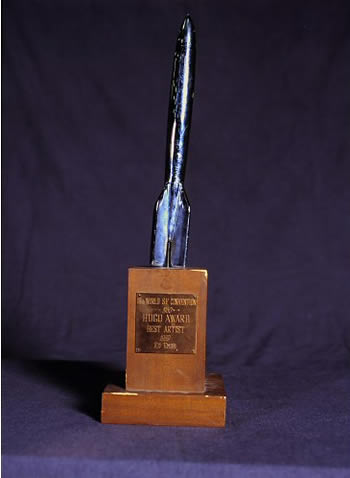
So, hats off to the organizing committee for another successful WorldCon! If you have any personal anecdotes from the convention, please drop me a line. In the meantime, I'll get cracking on this month's Analog. I'm not ashamed to confess that I emitted a little squeal of delight when I saw that Pauline Ashwell has the lead novella.

I wasn't anywhere near Pittcon either, so I can't comment on the event itself, just some general remarks on the Hugo Awards.
This was definitely F&SF's year, although there seem to be a lot of loyal Astounding/Analog readers. No fiction nominations for Galaxy, which is a sign of its decline. Nice to see a nod to Cele Goldsmith, the only female editor in the field, to my knowledge.
Vonnegut is an interesting writer. It's hard to judge based on only two novels ("Player Piano" of some years ago, which you may have seen as "Utopia 14," is in the dystopian satire vein) but he seems to be halfway between SF and mainstream fiction (although he could easily fit into Galaxy in its golden days.) I quite liked the Sheckley-ish "The Sirens of Titan."
"Flowers For Algernon" was an obvious choice. I have not yet read "Cat and Mouse" but I guess I'll have to, based on your review and its nomination.
"The Twilight Zone" seems to have captured the imagination of SF fans who want something halfway intelligence in the way of fantastic television.
Goldsmith got the nod by default. What magazines were left in 1959?!
Do read Cat and Mouse!
I could quibble and mention If and Fantastic Universe and Future and maybe a few others, but I take your point; those either had badly messed-up publishing schedules and/or were minor publications.
There's a bit of a formatting error: A "Best Short Fiction" heading is missing from above the short fiction winner and nominees.
Personally I'm glad I wasn't a voting member for this Hugo. I love both "Flowers for Algernon" and "The Man Who Lost the Sea" so much that I think my brain would have exploded if I'd had to choose between them.
Fixed, thank you!
They are both amazing and revolutionary stories. I didn't have that conundrum as, for the Galactic Stars, the former won Best Novelette, and the latter won Best Short Story.
The winners are pretty hard to argue with. I have to say, though, that I think the novel field is pretty weak. I read Dorsai! and remember absolutely nothing about it. The Leinster was enjoyable, pulpy fun, but second rate Leinster. The Vonnegut is quite good, though for all the window dressing, I'm not really sure I'd call it science fiction. On the surface it looks like the worst sort of trashy pulp, but there's some real depth under what is actually satire. I expect good things out of Mr. Vonnegut, but not necessarily within the genre.
I don't like that they cut down short fiction to a single category. In the past it's been Best Novelette and Best Short Story. Had they kept the division, the former would certainly have gone to "Algernon" and the latter to "The Man Who Lost the Sea". This merge unfairly handicaps shorter works, in my opinion, since longer short fiction has more room to develop characters and ideas. I hope they bring back the division soon, like next year, but I won't hold my breath.
Similarly mixing TV and movies seems like a bad idea. And do you judge a whole season's worth of episodes or should the voters just look at maybe the best episode of the season? On the other hand, it might be difficult to come up with a full list of decent nominees if you separate the two. I could imagine a year where a film like Dinosaurus could wind up on the ballot simply by default. (And speaking of Men Into Space, Murray Leinster has a novelization of it coming out next month.)
And speaking of the Twilight Zone, the new TV season is gearing up. From what I've seen so far in the TV Guide, there isn't much in the way of science fiction other than Mr. Serling's offering. There's that caveman Honeymooners cartoon I mentioned a couple weeks ago (called The Flintstones, apparently) and NBC is offering an anthology series hosted by Boris Karloff called Thriller, though that could wind up being more horror than sci-fi. It's following Hitchcock, so it might do pretty well, but it's on at the same time as Red Skelton, so I don't know if I'll watch it. I wish there were some way to be able to watch a show that's on at the same time as something else at a later point. It seems like the good shows are always on at the same time.
Thanks, D! The Galactic Stars will always separate the long from the short.
For television, it's not a perfect solution, but you might consider getting a second television (pricey, I know) and setting a tape recorder next to it. You won't get the visuals, but you might at least judge if a show is worthy, and you'll catch most of the plot points.
One of my cousins is involved in some of the cel animation work on "The Flintstones." The studio has been keeping the completed episodes under wraps, but the word around the studio is that is's not just "an adult cartoon" but an *extremely* adult cartoon, Not so much for pushing at the Hays Code as for storylines and characterizations that wouldn't be considered for regular live action television.
I haven't been able to pry much else from him, other than that he's going to vet the first few episodes carefully before deciding if he'll allow his children to watch it. I'm borderline skeptical myself, but I'll probably tune in to see what's going on if he thinks it's such a big deal.
There's a blurb in TV Guide about it. I debuts at the end of the month. I guess if I can do Dinosaurus, I can do The Flintstones!
> second rate Leinster
Ow, that hurts… I thought "The Pirates of Ersatz" was pretty good. Maybe not the best of Leinster's lengthy career, but at least worthy of consideration. And it was probably for the best that it wasn't one of his better efforts, given it was running against the Heinlein Steamroller.
While I liked "Starship "Troopers", it wasn't Heinlein's best work, either. There have been rumors that Heinlein and his main publisher have been at odds with each other, and I'm wondering if some of that has bled through. The book just seems… unfinished, somehow. I mean, it's good, but it's not "all of a piece" like most of his stuff. Well, except for "The Puppet Masters", where it looks like big chunks got left out somewhere along the way. Not as bad as that, though.
OK, second rate might have been too harsh. But it was a lot pulpier than most of his stuff, and I seem to remember a bit of almost Smithian superscience. In any case, I found it a bit subpar for Leinster.
Starship Troopers is somewhat on the episodic side, but I think that's intentional. Heinlein is trying to show us the better part of a full military career here, covering many years. If he'd tried to do that in a more conventional way, he'd have needed at least 400 or 500 pages and nobody's going to read something that long. It would be a prohibitive expense in both time and money.
I know what you mean about Puppet Masters, though. A lot of the stuff toward the end felt rushed. And I hear Gold rewrote a lot of it for the Galaxy version. Rumor also says that a lot of what got cut was simply too risque.
All in all, it might be a good thing that the publishing industry seems to have standardized on around 200 pages for a mass paperback. No telling how much some authors would sprawl if they had 300 pages to do it in.
Some genres have moves into "series novels." There has been some of that in SF – E.E. Smith, Edmond Hamilton, and Asimov have managed it – but for the most part that fad seems to have died out.
(well, Tom Swift is back *again*, but do we count children's books as SF? We're already branded as "escapist stories" and "trash literature", and some of those horrible TV shows a few years back have already conflated "SF" and "juvenile" in the public mind…)
I think the problem with Men Into Space is that for all its well-intentioned efforts, the episodes I've watched just felt too much like a filmed radio programme – particularly that first episode. You don't even need the visuals, half of the time. I've even tried listening to episodes as if they were on radio, and I didn't feel like I was missing much that mattered – though it improved on that as it went, a bit.
The Twilight Zone, on the other hand, really seems to understand that it's in a visual medium. The economy of dialogue is just quite delightful.
As for best novel – I think fans made the right decision, as well. I agree about Alas, Babylon as a nominee – but even if it had made the ballot, it shouldn't've beaten out Starship Troopers, not to my mind. So in the end, a difference that doesn't make much difference, I suppose.
I've travelled an awful lot, but I've never been to a Worldcon. Reports like this make me think I should – it looks awfully fun.
I'll be at a similar convention in Seattle in October. If you can make it, I'd love to meet you!
I can take a bus downtown easily enough – if I'm in town, I think I will!